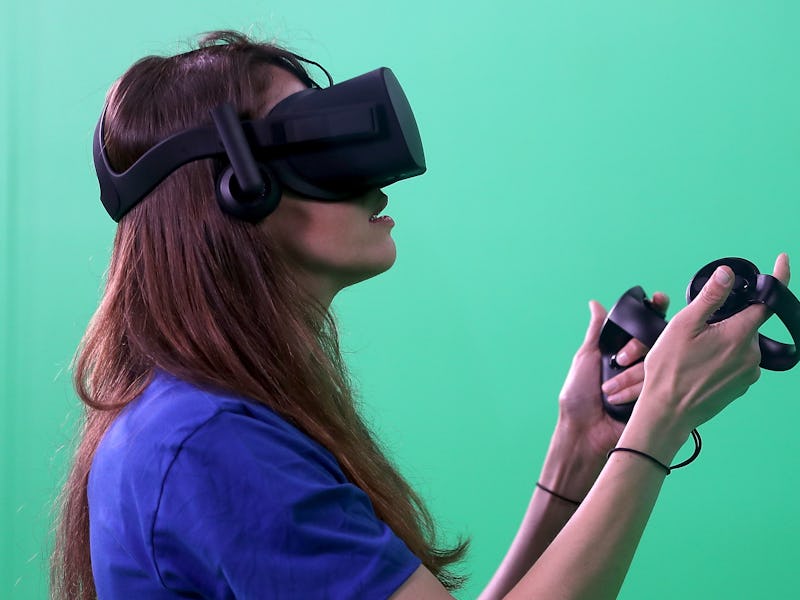5 Biggest Surprises From Facebook’s Developer Conference
Ready to hack your brain with drone-powered internet links?

Facebook has set out a bold new agenda, with brain hacking and virtual worlds all factoring into the social network’s future plans. At the annual F8 conference at McEnery Convention Center in San Jose, on Tuesday, CEO Mark Zuckerberg laid out his company’s plans for the coming years.
There’s a lot to take in, but here are five of the biggest takeaways from the two-day conference (which continues Wednesday) that show how Facebook has shifted its priorities onto what it thinks are going to be the most promising cutting-edge technologies:
Augmented Reality is the Next Big Thing
Facebook has marched further on its push to emulate some of Snapchat’s best features, and it thinks the underlying technologies could become the next big thing. “Act 2,” a push into augmented reality that launched Tuesday in a limited beta form, sees Facebook expanding out the real-time facial mapping that makes photo filters possible.
Beyond funny masks and cute dog ears, Zuckerberg sees Act 2 as part of a wider strategy to come up with some unique applications for augmented reality. Zuckerberg demonstrated new augmented reality features, built directly into the Facebook app, that can allow users to add virtual animals on to tables, and even build out a 3D model of the room to render it filled with water.
It’s an exciting expansion of Snapchat’s feature, and could form the basis for something huge. Developers will be able to build their own apps that take advantage of Facebook’s technology.
“We look at this and we see something different,” Zuckerberg told the audience. “We see the beginning of a new platform.”
Facebook’s Virtual World
Facebook Spaces is a virtual reality app that launched in beta form on Tuesday. Users can create a digital avatar and interact with people all over the world. Participants can draw, teleport into other worlds, take selfies, and share videos.
“The actors enjoyed shooting this video so much that they asked if they could stay in Spaces for a few hours after they were done,” Zuckerberg said alongside the video he uploaded of Spaces in action.
Facebook is Experimenting With a Brain Interface
“We’re building further out beyond augmented reality, and that includes work around direct brain interfaces that one day will let you communicate using only your mind, although that stuff is pretty far out,” Zuckerberg told the audience.
A hint that Facebook was working on a brain wave system surfaced in January, when the secretive Building 8 team posted a job listing for a brain-computer interface engineer that would cover the “application of machine learning methods, including encoding and decoding models, to neuroimaging and electrophysiological data.”
Zuckerberg wouldn’t be the first mind to consider brain hacking. Elon Musk has announced a new company called Neuralink, which would use neural lace to directly interface with the brain. As Facebook’s job ad covers less invasive methods, it’s likely that the company’s eventual solution would focus more on measuring brain waves.
Aquila Drone
Facebook has improved its millimeter wave radio technology, so it can use drones to transmit data to some of the most remote parts of the world. The Aquila drone is at the center of these plans: with a wingspan wider than a Boeing 737, and a weight of fewer than 1,000 pounds, Aquila will stay afloat for months at a time, generating power through its solar panels.
Last year, the company could transfer 20 gigabits per second over a distance of eight miles. At the conference, Facebook said it had improved on this, reaching a data transfer speed of 80 gigabits per second. It’s also been able to link up the drone with a base station at speeds of 16 gigabits per second over a distance of five miles.
The company is planning more test flights for Aquila this year, after suffering a setback when the drone secretly crashed last November.
Advanced Artificial Intelligence
Facebook is working on more improved artificial intelligence. On stage, the company demonstrated how asking a computer whether a pizza is vegetarian can be a difficult task, but the company is working on solutions that would allow for this. The breakthrough could lead to more natural language bot interactions and even automatic translation in videos.